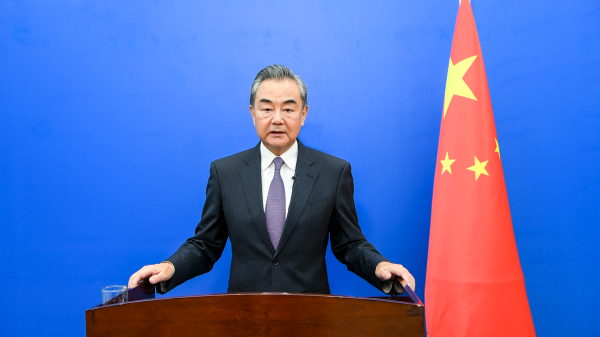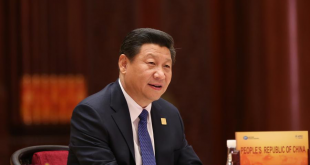Published:July26,2022

Chinese State Councilor and Foreign Minister Wang Yi speaks at a virtual symposium commemorating the 20th anniversary of the signing of the Declaration on the Conduct (DOC) of Parties in the South China Sea, July 25, 2022. /China’s Foreign Ministry
Chinese State Councilor and Foreign Minister Wang Yi on Monday called on countries in the region to maintain their position in solving the South China Sea issue.
Wang made these remarks at a virtual symposium commemorating the 20th anniversary of the signing of the Declaration on the Conduct (DOC) of Parties in the South China Sea.
He called for unswervingly practicing the norms and propositions of the DOC, making the South China Sea “a sea of peace, a sea of friendship and a sea of cooperation.”
Representatives of the governments of China and the members of the Association of Southeast Asian Nations (ASEAN) signed the DOC in Cambodian capital Phnom Penh in 2002. It is the first political document between China and the ASEAN countries on dealing with the South China Sea issue at the regional level.
South China Sea is not a ‘safari park’
The South China Sea is not a “safari park” for countries outside the region or a “fighting arena” for major powers to compete in, Wang stressed at the seminar.
He said the regional countries should support all efforts conducive to the peaceful resolution of disputes, oppose words or actions that create tensions and provoke confrontation, and stand on the side of the peaceful aspirations of all peoples.
Calling dialogue and consultation the fundamental path to resolving conflicts, Wang urged related parties to continuously promote dialogue as it is also the DOC’s spirit.
Wang also called for deepening maritime cooperation, as the South China Sea is the common wealth of the countries in the region.
He said related parties should actively promote pragmatic cooperation in scientific research, environmental protection, search and rescue and other fields, and explore the joint development of resources for the betterment of regional countries and people.
In addition, Wang urged efforts to steadily promote the consultation on the code of conduct (COC) in the South China Sea to provide stronger institutional safeguards for managing differences and promoting cooperation.
Peace, stability are prerequisites
Referring to the important insights from the successful practice of the signing and implementation of the DOC, Wang said peace and stability in the South China Sea are the important prerequisites for regional development.
Establishing that the regional countries are the “real masters” in dealing with the South China Sea issue, Wang said the dual-track approach of dealing with the issue – peaceful and proper handling of the disputes – came through direct talks between the parties involved. It is in line with the regional reality and effective in maintaining the overall stability of the South China Sea, he added.
“In the process of implementing the DOC, we have always followed the Asian tradition of mutual respect and keeping promises, abandoned the zero-sum mindset, which has manifested the great value and vitality of the declaration,” he said.
Observing that today’s South China Sea is not calm, Wang said extraterritorial powers were throwing more strength in the region to maintain their hegemony, deliberately expanding conflicts and provoking tensions, which jeopardized the legitimate rights and interests of coastal countries and the normal order of the sea.
In this regard, the Chinese foreign minister said China and ASEAN countries should make their attitude clear that they welcome countries to come to the South China Sea in the cause of peace and cooperation while rejecting countries with an aim of making disorder and destruction in the region.
cgtn.com
 Africa -China Review Africa -China Cooperation and Transformation
Africa -China Review Africa -China Cooperation and Transformation
